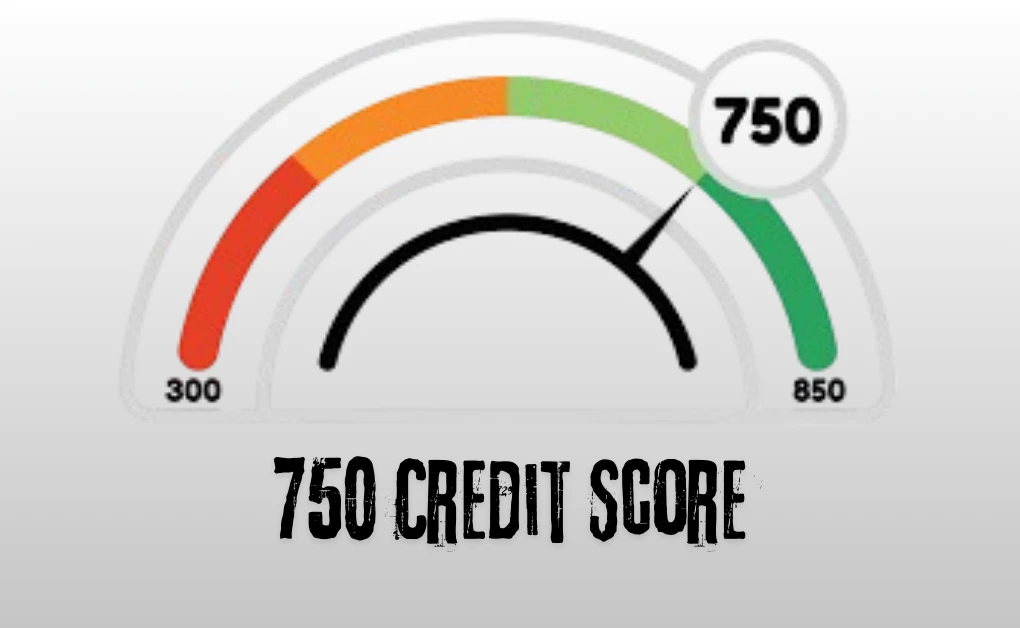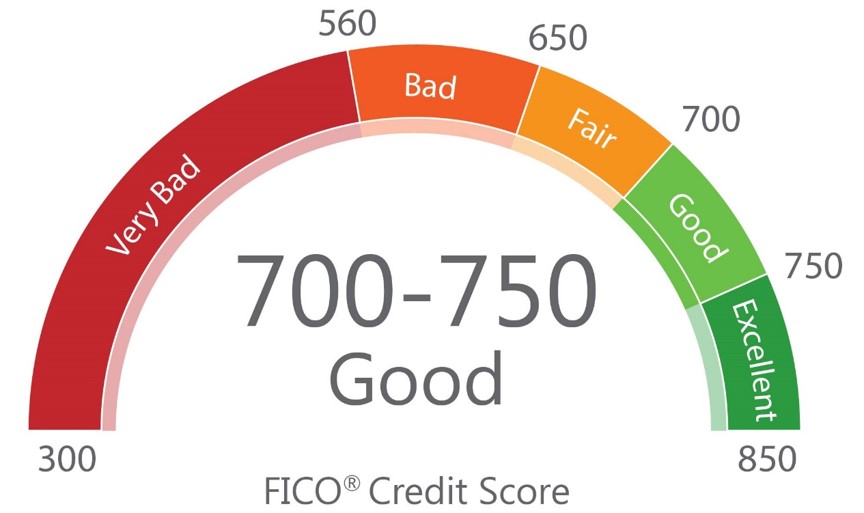Now Reading: 750 Credit Score: Unlock Financial Freedom Today
-
01
750 Credit Score: Unlock Financial Freedom Today
750 Credit Score: Unlock Financial Freedom Today

Have you ever wondered why financial experts keep talking about the magic number – the 750 credit score? You might be surprised to learn that this number can unlock doors to financial opportunities you never imagined.
Picture yourself effortlessly securing a loan with an attractive interest rate or getting approved for that dream apartment. With a 750 credit score, these possibilities are within your reach. But what exactly does this score represent, and why is it so pivotal for your financial future?
Dive into this article, and you’ll uncover the secrets behind the 750 credit score, learn how it impacts your life, and discover actionable steps to achieve it. Get ready to transform the way you think about credit, because understanding your score is the first step to financial empowerment.
Benefits Of A 750 Credit Score
A 750 credit score is considered excellent. It offers many financial advantages. This score opens doors to better interest rates and increased loan approvals. It also provides access to higher credit limits. Understanding these benefits helps you make informed financial decisions.
Access To Better Interest Rates
Credit scores affect interest rates on loans and credit cards. A 750 score often leads to lower interest rates. This saves money over time on big purchases like homes or cars. Lower rates mean smaller monthly payments and less stress.
Increased Loan Approval Chances
Lenders trust borrowers with high credit scores. A 750 score gives you a stronger chance of loan approval. Whether it’s a mortgage or a car loan, you face fewer hurdles. Lenders see you as a responsible borrower. This trust can lead to faster approvals.
Higher Credit Limits
With a 750 score, credit card companies may offer higher limits. This means you have more spending power. It also helps manage your credit utilization ratio. Keeping this ratio low can improve your credit score further. Higher limits provide financial flexibility.

Building A 750 Credit Score
Achieving a 750 credit score involves consistent payment of bills on time and maintaining low credit card balances. Regularly checking credit reports for errors helps prevent discrepancies that could lower scores. Reducing debt and avoiding frequent credit inquiries further supports the journey to a strong credit rating.
Building a 750 Credit Score Achieving a 750 credit score is a significant milestone. It opens doors to better interest rates and financial opportunities. But how do you get there? Let’s explore some practical strategies to boost your credit score effectively.
Timely Bill Payments
Paying your bills on time is crucial. It might seem simple, but it has a significant impact on your credit score. Late payments can stay on your credit report for up to seven years. Consider setting up automatic payments or reminders. This ensures you never miss a due date. Even one late payment can hurt your score. Think about your future self. How would you feel knowing you missed out on a better mortgage rate because of a few late payments?
Managing Credit Utilization
Your credit utilization ratio is the balance on your credit cards compared to your credit limit. Keeping this ratio below 30% is ideal. It shows lenders you can manage credit responsibly. If your balance is $1,000 on a card with a $5,000 limit, your utilization is 20%. This is a healthy percentage. Regularly paying down your balance can help. Avoid the temptation to max out your cards, even if you plan to pay them off each month.
Diverse Credit Mix
Having a diverse credit mix is beneficial. This means having different types of credit accounts, like credit cards, a mortgage, or a car loan. It demonstrates to lenders that you can handle various credit responsibilities. However, don’t take on new debt just for the sake of diversity. Only open accounts you truly need. Each hard inquiry can slightly lower your score. Reflect on your credit history. Does it include a variety of credit types? If not, consider how you might naturally diversify over time. Building a 750 credit score is within reach with consistent effort. By focusing on these key areas, you can set yourself up for financial success. What’s one step you can take today to improve your credit score?
Maintaining Your Credit Score
A 750 credit score opens doors to better interest rates and loan approvals. Pay bills on time and keep credit card balances low to maintain it. Regularly check your credit report for errors and correct them promptly.
Maintaining a 750 credit score is crucial for financial stability and growth. This score opens doors to better interest rates, favorable loan terms, and enhanced credit opportunities. But how do you keep your credit score in tip-top shape? It requires consistent attention, simple habits, and smart financial decisions. Let’s dive into some actionable tips to maintain your stellar credit score.
Regular Credit Report Checks
Keeping an eye on your credit report is like checking the oil in your car. It’s preventative care. By reviewing your credit report regularly, you can catch errors or fraudulent activity early. I once found an unexpected credit card inquiry that wasn’t mine. Addressing it promptly saved my score. Use free annual reports to monitor your credit health. Ask yourself: When was the last time you checked your credit report?
Handling Credit Card Balances
Credit card balances have a significant impact on your credit score. Aim to keep your credit utilization below 30%. This means if your credit limit is $10,000, try not to exceed a $3,000 balance. Paying off your balance in full each month is the best approach. It shows lenders you manage credit responsibly. You might find it helpful to set up automatic payments. This ensures you never miss a due date.
Limit Hard Inquiries
Each time you apply for credit, it can result in a hard inquiry on your report. Multiple inquiries within a short period can lower your score. Before applying for new credit, consider if it’s necessary. During my first year managing my credit, I made the mistake of applying for multiple cards. It taught me a valuable lesson about being strategic. Be mindful of the impact of each inquiry. Maintaining a 750 credit score doesn’t have to be daunting. Simple, consistent actions can lead to long-term benefits. What small steps can you take today to secure your financial future?
Common Misconceptions
A 750 credit score is often viewed as a badge of financial responsibility and stability. However, there are several misconceptions that might lead you astray in your quest for maintaining or achieving this coveted score. Understanding these myths can empower you to take more informed decisions about your financial health. Let’s dive into some common misconceptions about credit scores and see how they might be impacting your financial journey.
Credit Score Vs. Income
Many people believe that a high income automatically leads to a high credit score. This is not true. Your credit score reflects your credit behavior, not your paycheck.
Whether you earn $30,000 or $300,000 a year, your credit score is affected by how responsibly you manage your credit. Paying bills on time and keeping credit card balances low play a much bigger role.
So, if you’ve been thinking that boosting your income will increase your credit score, you might want to focus on your spending habits instead.
Impact Of Closing Accounts
It’s common to think that closing unused credit accounts will improve your score. However, this can actually harm it. Closing accounts may decrease your available credit and increase your credit utilization ratio.
Imagine this: You have two credit cards with limits of $5,000 each, but you decide to close one. If you owe $2,000 on the remaining card, your utilization jumps from 20% to 40%, which can negatively impact your score.
Consider keeping those old accounts open, especially if they have no annual fees, to maintain a healthy credit utilization ratio.
Effect Of Small Debts
Don’t underestimate the impact of small debts on your credit score. Even minor debts can affect your score if left unpaid or ignored.
Think about that $50 bill you forgot to pay. It might seem trivial, but a missed payment can be reported to credit agencies and result in a drop in your score.
Regularly check your accounts and settle small debts promptly. It’s these small actions that collectively help maintain a strong credit score.
As you navigate the complexities of credit scores, ask yourself: Are you letting misconceptions guide your financial decisions? Understanding the truth behind these myths can help you take control and improve your financial standing effectively.
Tools And Resources
Achieving a 750 credit score opens doors to better financial opportunities. Utilize online credit score calculators and financial planning apps to track progress effectively. Access reliable resources like credit bureaus for free reports and expert advice.
Achieving a 750 credit score is a commendable milestone, but maintaining and improving it can be a daunting task. Luckily, there are numerous tools and resources available to help you manage your credit effectively. Leveraging these tools can simplify the process and offer peace of mind. They can also provide deeper insights into your credit health.
Credit Monitoring Services
Credit monitoring services can be your best ally in maintaining a high credit score. They help keep track of your credit report, alerting you to any significant changes or suspicious activities. Consider them as a security system for your financial health. Services like Experian, Equifax, and TransUnion offer real-time updates and can even assist in detecting identity theft. Have you ever noticed an unexpected dip in your score? These services can pinpoint the reason and guide you in addressing it quickly.
Financial Planning Advisors
Consulting with a financial planning advisor can offer personalized strategies to keep your credit score in top shape. These professionals can provide insights that are tailored to your unique financial situation. They can also help you set realistic goals and offer actionable steps to achieve them. Think of a time when you were unsure about a financial decision. A financial advisor could have provided clarity and direction. Their expertise not only aids in maintaining your credit score but also in enhancing your overall financial well-being.
Online Credit Score Calculators
Online credit score calculators are a quick and convenient way to assess your financial standing. These tools can simulate how various actions might impact your score. By inputting different scenarios, you can see potential outcomes before making financial decisions. Consider using calculators from websites like Credit Karma or NerdWallet. They are user-friendly and can provide immediate feedback. Have you ever wondered how opening a new credit card might affect your score? These calculators can give you a preview without any commitment. Incorporating these resources into your financial routine can make a significant difference. They empower you to make informed decisions, helping you to not only maintain but potentially improve your credit score. What tools have you tried, and how have they impacted your credit journey?
Real-life Success Stories
Achieving a 750 credit score is a significant milestone that can open doors to numerous opportunities. But how do people get there? Real-life success stories offer valuable insights into the journey of building a strong credit score. These stories not only highlight the strategies that work but also provide inspiration for anyone looking to improve their financial situation. Let’s dive into some compelling narratives that showcase the power of a 750 credit score.
Turning Around Poor Credit
Imagine the stress of juggling multiple debts and watching your credit score plummet. This was the reality for Sarah, who found herself with a score in the low 500s. She took control by consolidating her debts and setting up automatic payments. Within a year, her score soared to 750.
The key takeaway from Sarah’s journey is perseverance. She focused on small, manageable steps rather than attempting a quick fix. Have you considered a similar approach for your credit challenges?
Leveraging High Scores For Business
John’s 750 credit score became his secret weapon in launching a successful startup. With excellent credit, he secured a business loan with favorable terms, reducing initial costs significantly. This allowed him to invest more in marketing and product development.
John’s story highlights the importance of a strong credit score in business ventures. A high score can provide access to better financial tools. Could your credit score be the key to your entrepreneurial dreams?
Personal Finance Transformations
Emily’s financial journey is an inspiring tale of discipline and strategic planning. With a 750 credit score, she negotiated a lower interest rate on her mortgage, saving thousands over time. Her score also enabled her to qualify for premium credit card rewards.
Emily’s experience is a testament to how a high credit score can transform personal finances. It’s not just about borrowing more—it’s about borrowing smarter. How might improving your credit score change your financial landscape?
These real-life success stories prove that with dedication and strategic planning, you can achieve and leverage a 750 credit score for various benefits. Whether you’re turning around poor credit, starting a business, or transforming your personal finances, the path to a high score is within reach. What’s your credit story going to be?
You can also read more in therecentmagazine
Frequently Asked Questions
What Can A 750 Credit Score Get You?
A 750 credit score can secure you better loan terms, lower interest rates, and higher credit limits. It boosts your approval chances for mortgages, car loans, and credit cards. This score reflects strong financial responsibility, making you a preferred applicant for various financial opportunities and benefits.
How Many Americans Have A 750 Credit Score?
Approximately 25% of Americans have a credit score of 750 or higher. This score is considered excellent. High credit scores offer better loan terms and interest rates. Regularly checking your credit report helps maintain a good score.
Does A 750 Vs 800 Credit Score Matter?
A 750 versus 800 credit score can impact loan interest rates and terms. Higher scores usually secure better offers.
How To Go From 750 To 850 Credit Score?
Pay bills on time and reduce credit card balances. Avoid new credit inquiries. Diversify credit types. Check and dispute credit report errors. Maintain a long credit history.
Conclusion
Achieving a 750 credit score is a great milestone. It opens doors to better loan offers. This score shows you manage credit well. Keep paying bills on time. Reduce your debt to boost your score. Review your credit report regularly.
Look for any errors and fix them quickly. A good credit score benefits you in many ways. It helps in securing lower interest rates. Stay informed and make smart financial decisions. Your efforts today will lead to a stable financial future.
Keep up the good work and watch your financial opportunities grow.























Pingback: FintechZoom | Real-Time Fintech News & Market Analysis